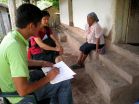(Press-News.org) There are now over 80,000 apps marketed as "educational" in the Apple app store, the majority of which are targeted towards children and even babies. Parents are led to believe that these apps provide real learning opportunities for their children, but scientific research suggests that many of the apps are nothing more than digital candy.
"Many apps marketed as 'educational' are basically the equivalent of sugary foods," says Kathy Hirsh-Pasek of Temple University, co-author on a new report investigating educational apps. "At best, most of these apps will do no harm; at worst, they add even more distraction to children's deeply distracting lives."
In the comprehensive report, Hirsh-Pasek and an interdisciplinary team of researchers including Jennifer Zosh (Penn State University, Brandywine), Roberta Michnick Golinkoff (University of Delaware), and colleagues seek to provide parents, educators, and app designers with an evidence-based guide they can use to evaluate apps for real educational benefits.
The report, published in Psychological Science in the Public Interest, a journal of the Association for Psychological Science, reviews available research on the science of learning from diverse fields including psychological science, neuroscience, and linguistics.
Based on their findings, the researchers identify the features that parents and educators should avoid and those they should seek out to find high-quality educational apps amidst all the "empty-calorie" junk:
Avoid apps that keep children's attention through passive activities, like repetitive swiping. Instead, look for apps that require real mental effort and depend on the child's active participation.
Avoid apps that feature a lot of distracting "bells and whistles." Instead, look for apps that support sustained engagement with the task at hand.
Avoid apps that present children with knowledge in a vacuum. Instead, look for apps that help children make meaningful connections between new information and what they already know.
Avoid apps that don't involve the most powerful learning resource we have -- other humans. Instead, look for apps that encourage social interaction via discussion, competition, or conversation.
Avoid apps that tell your child what to know. Instead, look for apps that use guided exploration to help your child discover new information on their own terms.
"We want parents to know that claims about educational content are completely unregulated, any app developer can slap the 'educational' label on their product," says Hirsh-Pasek. "Using scientific research as a guide, we can help parents begin to evaluate the morass of stuff that exists in the app store."
Zosh adds, "The challenge parents face is to determine which apps truly are educational and which are simply masquerading as such. We sought to empower parents to make educated decisions about what is actually educational."
For example, while findings released last week indicate that app usage is becoming increasingly common among young children and even babies, scientific research has yet to evaluate the educational benefit of these kinds of digital media.
And even when an app has content that looks like it should be educational, like letters or numbers, it doesn't mean that the app has true educational value. A particular problem in apps available today, the researchers found, is the use of so-called enhancements, like hot spots, sounds, and games that grab children's attention in the middle of a story or activity.
"While these 'bells and whistles' might be fun, research suggests that these kinds of distractions actually take away from, rather than enhance, learning," the researchers explain in a Q&A about the new report.
In the end, if an app seems too good to be true, it probably is, the researchers say.
"Many apps make dramatic promises -- from teaching advanced concepts to infants or even changing your child's brain," notes Zosh. "Parents should use common sense and remember that an app -- even an educational app - is just an app, not a miracle."
INFORMATION:
The Q&A with the authors of the report is available online at http://www.psychologicalscience.org/index.php/publications/observer/obsonline/qa-with-pspi-authors.html
The full report, and accompanying commentary by communications researcher Ellen Wartella (Northwestern University), are available online at http://www.psychologicalscience.org/index.php/publications/educational-apps.html.
For more information about this study, please contact:
Kathy Hirsh-Pasek at khirshpa@temple.edu.
Jennifer Zosh at jzosh@psu.edu.
Psychological Science in the Public Interest is a journal of the Association for Psychological Science. It publishes an eclectic mix of thought-provoking articles on the latest important advances in psychology. For a copy of the article "Putting Education in 'Educational' Apps: Lessons From the Science of Learning" and access to other Psychological Science in the Public Interest research findings, please contact Anna Mikulak at 202-293-9300 or amikulak@psychologicalscience.org.
NEW YORK (May 6, 2015) -- To fence or not to fence? That is the question facing conservationists concerned with barriers that keep wildlife in and people out.
According to a new study by the Zoological Society of London (ZSL), Wildlife Conservation Society (WCS) and other groups, appearing in April 20 edition of the Journal of Applied Ecology, new policies must be developed before fences are erected - particularly in dryland ecosystems where mobility is essential for both humans and wildlife.
Some nations are considering fences as a means to protect remnant wildlife ...
This news release is available in German.
An X-ray study carried out at DESY allows to improve the quality of chocolate. The study offers new insights into the formation of fat bloom, an unwelcome white layer that occasionally forms on chocolate. "Although fat blooming is perfectly harmless, it causes millions in damage to the food industry as a result of rejects and customer complaints," explains the main author of the study, Svenja Reinke, from the Hamburg University of Technology (TUHH). "Despite this well known quality issue, comparatively little has been known ...
(BOSTON) - Increasingly, scientists across the world and in the Unites States are reporting new and groundbreaking innovations in biotechnology with transformative implications in human health and environmental sustainability. Examples range from synthetically created, metabolically-engineered bacteria for the sustainable production of fuel to gene editing therapies that could one day help in the prevention and treatment of a large number of human diseases.
While these technologies are developed in laboratories, researchers are not only giving utmost consideration to ...
New Haven, Conn. - Convincing a large group of people to change its behavior is no popularity contest, a new study shows.
In a novel experiment, researchers found that certain public health interventions work best when key "influencers" in a face-to-face social network are exposed to the program. What's surprising, they say, is that those key influencers are not the most socially connected people in the network.
Furthermore, those individuals can be identified through a survey method informed by network structure rather than costly and time-consuming social network mapping. ...
Maybe it's not such a dog-eat-dog world after all. A clever combination of two different types of computer simulations enabled a group of Illinois researchers to uncover an unexpectedly cooperative group dynamic: the spontaneous emergence of resource sharing among individuals in a community. Who were the members of this friendly, digitally represented collective? Escherichia coli, rod-shaped bacteria found in the digestive systems of humans and many other animals.
The finding, initially predicted by mathematical models and then confirmed through empirical testing, was ...
Chocolate is one of the world's most popular foods, but when a whitish coating called a bloom appears on the confection's surface, it can make consumers think twice about eating it. The coating is made up of fats and is edible, but it changes the chocolate's appearance and texture -- and not for the better. Now scientists report in the journal ACS Applied Materials & Interfaces new information that could help chocolatiers prevent blooms from forming.
Svenja K. Reinke and colleagues explain that baked goods and confectionery products, including chocolate, contain a mix ...
WASHINGTON, DC (May 6, 2015) -- Patients with a history of trauma can benefit from working with healthcare providers who understand trauma's role in health and can offer resources to assist with healing. A commentary published today in the journal Women's Health Issues proposes an approach to providing such trauma-informed primary care (TIPC). Edward L. Machtinger, MD, director of the Women's HIV Program (WHP) at the University of California, San Francisco, and his co-authors identify four core components of a TIPC approach: environment, screening, response, and a robust ...
Diagnosing a heart attack can require multiple tests using expensive equipment. But not everyone has access to such techniques, especially in remote or low-income areas. Now scientists have developed a simple, thermometer-like device that could help doctors diagnose heart attacks with minimal materials and cost. The report on their approach appears in the ACS journal Analytical Chemistry.
Sangmin Jeon and colleagues note that one way to tell whether someone has had a heart attack involves measuring the level of a protein called troponin in the person's blood. The protein's ...
Conventional silicon-based computing, which has advanced by leaps and bounds in recent decades, is pushing against its practical limits. DNA computing could help take the digital era to the next level. Scientists are now reporting progress toward that goal with the development of a novel DNA-based GPS. They describe their advance in ACS' The Journal of Physical Chemistry B.
Jian-Jun Shu and colleagues note that Moore's law, which marked its 50th anniversary in April, posited that the number of transistors on a computer chip would double every year. This doubling has ...
COLUMBUS, Ohio - A new study has identified a regulatory pathway in natural killer cells that inhibits their maturation and homing behavior. Natural killer cells are one of the body's first lines of defense against viruses and cancer. The findings could lead to new strategies for boosting natural-killer cell activity against cancer and viral infections.
The study was led by researchers at The Ohio State University Comprehensive Cancer Center - Arthur G. James Cancer Hospital and Richard J. Solove Research Institute (OSUCCC - James). It showed that a protein called Foxo1 ...


